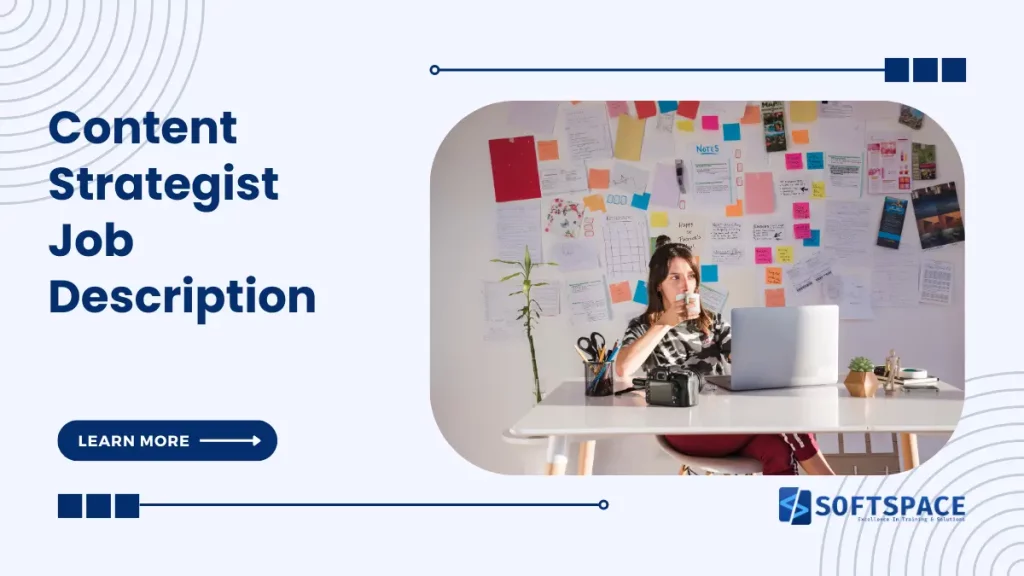As a content strategist, I have come to understand the critical role this position plays in the success of digital marketing efforts. In this article Content Strategist Job Description, I will provide a comprehensive overview of the responsibilities, skills, and qualifications required for a content strategist.
Additionally, I will explore the importance of content strategy in digital marketing, how content strategists collaborate with other teams, the tools and technologies they use, examples of successful content strategy implementations, the challenges, and opportunities they face, and finally, how one can become a content strategist. Let’s dive in!
Table of Contents
Introduction To Content Strategist Job Description
A content strategist is responsible for developing and executing a content strategy that aligns with the overall marketing objectives of an organization. This involves creating a roadmap for content creation, distribution, and management across various digital platforms.
The role requires a deep understanding of the target audience, market trends, and competitive landscape.
A content strategist must possess exceptional communication and analytical skills. They should be able to identify content gaps, conduct thorough keyword research, and develop a content calendar that ensures consistent and engaging messaging.
Moreover, they must stay up to date with industry best practices and emerging trends to ensure the content strategy remains effective and relevant.
Key Responsibilities of a Content Strategist
A content strategist is responsible for a lot of different things. One of the main jobs is to do a full content check to see how well the current content is doing and find places where it can be improved. This means looking at website traffic, engagement metrics, and user feedback to find out how well the current content plan is working.
Based on the results of the content audit, a content strategist will create a content strategy that fills in the gaps and fits with the business goals of the company.
This includes making personas for your target audience, mapping out the customer journey, and making a content calendar that lists the topics, formats, and methods of distribution for each piece of content.
Once there is a content strategy, the content planner will work with different teams, like writers, designers, and SEO experts, to make sure the strategy is carried out well.
They will advise on how to create, optimize, and distribute content. They will also keep an eye on how the content is doing and make any changes that are needed to get better results.
Content Strategist Job Description [Skills & Qualifications]
To excel as a content strategist, a combination of skills and qualifications is required. First and foremost, excellent communication and writing skills are essential.
A content strategist must be able to articulate complex ideas clearly and concisely, ensuring that the message resonates with the target audience.
Analytical skills are also crucial for a content strategist.
- They must be able to interpret data, identify trends, and make data-driven decisions to optimize the content strategy.
- Proficiency in tools such as Google Analytics, SEO software, and social media analytics platforms is highly beneficial.
A content strategist should also possess a strong understanding of SEO principles and best practices. This includes knowledge of keyword research, on-page optimization, and link-building strategies. Moreover, they should be familiar with content management systems and have a basic understanding of HTML and CSS.
Lastly, a content strategist should be a strategic thinker and possess excellent organizational and project management skills. They should be able to prioritize tasks, meet deadlines, and handle multiple projects simultaneously. Additionally, they should have a keen eye for detail and be able to spot opportunities for improvement and optimization.
A Typical Content Strategist Job Description looks like this:
A content strategist is responsible for developing and implementing strategies to create, organize, and manage content across various platforms and channels. Their primary goal is to ensure that content aligns with the organization’s objectives, resonates with the target audience, and drives engagement and conversions. Here’s a detailed job description for a content strategist:
Job Title: Content Strategist
Job Overview: As a content strategist, you will be responsible for planning, developing, and managing content initiatives to support and achieve the organization’s goals. You will collaborate with cross-functional teams, including marketing, design, and product development, to create compelling content that resonates with the target audience and drives engagement. Your role will involve analyzing content performance metrics, conducting market research, and staying updated on industry trends to inform content strategy decisions.
Key Responsibilities:
- Develop and execute content strategies that align with the organization’s objectives and target audience.
- Collaborate with internal teams to identify content needs and opportunities across various platforms and channels.
- Conduct content audits to assess existing content and identify gaps and areas for improvement.
- Create editorial calendars and content plans to ensure timely and consistent delivery of high-quality content.
- Research industry trends, competitor strategies, and audience preferences to inform content strategy decisions.
- Define key performance indicators (KPIs) and metrics to measure the effectiveness of content initiatives.
- Analyze content performance data and insights to optimize content strategy and drive continuous improvement.
- Ensure that all content is on-brand, consistent in style, tone, and voice, and optimized for SEO.
- Stay updated on emerging technologies and best practices in content marketing and digital media.
- Collaborate with designers, writers, and other stakeholders to produce multimedia content, including articles, blog posts, videos, infographics, and social media posts.
- Provide guidance and support to internal teams on content creation, optimization, and distribution best practices.
- Monitor industry developments and regulatory changes that may impact content strategy and compliance.
Qualifications:
- Bachelor’s degree in marketing, communications, journalism, or a related field. Advanced degree preferred.
- Proven experience in content strategy, content marketing, or a related role.
- Excellent writing and editing skills, with a keen eye for detail and accuracy.
- Strong analytical skills and the ability to interpret data to inform content strategy decisions.
- Proficiency in content management systems (CMS), analytics tools, and SEO best practices.
- Experience with project management and collaboration tools (e.g., Asana, Trello, Slack).
- Creative thinking and problem-solving abilities, with a passion for storytelling and audience engagement.
- Strong organizational and time management skills, with the ability to manage multiple projects and deadlines.
- Excellent communication and interpersonal skills, with the ability to collaborate effectively with cross-functional teams.
- Knowledge of digital marketing trends, social media platforms, and content distribution channels.
Additional Information:
- This is a full-time position based in [location].
- Occasional travel may be required for conferences, workshops, or client meetings.
- Flexible work hours may be available, depending on business needs.
- We offer competitive compensation and benefits packages, including health insurance, retirement plans, and professional development opportunities.
Note: This job description is intended to convey information essential to understanding the scope of the role and is not exhaustive. Duties, responsibilities, and qualifications may change as the needs of the organization evolve.
The Importance of Content Strategy in Digital Marketing
Content strategy plays a vital role in the success of digital marketing efforts. It ensures that the right message reaches the right audience at the right time, ultimately driving engagement, conversions, and brand loyalty.
Digital Marketing and its impact on small businesses can be verified with social presence, relevant content and organic growth. It is a time-consuming, but better process to generate leads and recurring sales with an audience who finds your content relevant.
A well-developed content strategy allows organizations to establish thought leadership, build trust with their audience, and differentiate themselves from competitors.
By understanding the target audience’s pain points and interests, a content strategist can create content that resonates with them and provides value, positioning the organization as a trusted source of information.
Furthermore, content strategy enhances search engine visibility and organic traffic. By conducting keyword research and implementing SEO best practices, a content strategist can optimize content to rank higher in search engine results pages.
This increases the likelihood of attracting organic traffic, expanding the organization’s reach, and generating valuable leads.
As a part of Digital Marketing, content plays a crucial role in bringing the right audience to your website. To learn more about it, you can check our Digital Marketing Course which provides comprehensive guidance on Digital Marketing strategies, content marketing and much more.
How Content Strategists Collaborate with Other Teams
Content strategists work closely with various teams to ensure the successful execution of the content strategy. Collaboration with writers is essential to ensure that the content produced aligns with the overall strategy and meets the desired quality standards.
Content strategists provide writers with detailed briefs, style guides, and keyword research to guide the content creation process.
Collaboration with designers is crucial to ensure that the visual elements of the content are engaging and aligned with the overall brand image. Content strategists provide input on the design direction, ensuring that the visuals effectively complement the written content and enhance the overall user experience.
Additionally, content strategists collaborate with SEO specialists to optimize the content for search engines. They provide keyword research and guidelines for on-page optimization, such as meta tags, headings, and internal linking.
By working together, content strategists and SEO specialists ensure that the content is discoverable and drives organic traffic.
Tools and Technologies Used by Content Strategists
Content strategists rely on a variety of tools and technologies to streamline their workflow and enhance their effectiveness. Here are some commonly used tools:
- Content Management Systems (CMS): CMS platforms, such as WordPress and Drupal, provide content strategists with a centralized hub for content creation, editing, and publishing. These platforms offer features like content scheduling, version control, and collaboration capabilities.
- SEO Software: Tools like Moz, SEMrush, and Ahrefs help content strategists with keyword research, competitor analysis, and tracking search engine rankings. These tools provide valuable insights to optimize content for search engines and drive organic traffic.
- Analytics Platforms: Google Analytics and other analytics platforms enable content strategists to track website traffic, user behaviour, and engagement metrics. This data helps them assess the performance of the content strategy and make data-driven decisions to improve results.
- Social Media Management Tools: Tools like Hootsuite and Buffer assist content strategists in planning and scheduling social media posts. These tools provide analytics and reporting features, allowing content strategists to measure the effectiveness of their social media efforts.
Importance of Seo Knowledge
SEO knowledge is crucial for content strategists as it significantly impacts website performance and return on investment. Effective SEO copywriting and content strategy are essential for improving website engagement, attracting organic traffic, and staying competitive online. By combining SEO and content marketing, businesses can maximize organic content visibility and drive interest from their target audience.
Developing an effective SEO content strategy involves creating high-quality, reader-focused content that answers audience questions while optimizing for search engines. SEO not only builds trust, credibility, and brand recognition but also connects businesses with customers throughout their buyer’s journey, making it a scalable growth channel.
In the dynamic landscape of marketing, pursuing a career in SEO offers various paths such as SEO Specialist, Content Strategist, Technical SEO Manager, Link Building Specialist, Local SEO Specialist, E-commerce SEO Manager, SEO Consultant, SEO Data Analyst, SEO Trainer, and SEO Manager. To excel in an SEO career, individuals need to build a strong foundation in digital marketing, enhance writing skills, acquire basic development knowledge, improve analytical skills, and familiarize themselves with essential SEO tools.
Examples of Successful Content Strategy Implementations
Successful content strategy implementations can be found across various industries and organizations. Let’s explore a few examples:
- Red Bull: Red Bull has built a content strategy centred around extreme sports and adventure. They produce high-quality videos, articles, and social media content that resonate with their target audience of adrenaline junkies. By aligning its content with its brand values, Red Bull has successfully positioned itself as the go-to energy drink for thrill-seekers.
- HubSpot: HubSpot, a leading marketing automation platform, has developed a content strategy focused on providing valuable educational resources to marketers. Their blog, ebooks, and webinars cover a wide range of marketing topics and offer actionable insights. By offering valuable content, HubSpot attracts and nurtures a large audience, positioning itself as a trusted authority in the marketing industry.
- Nike: Nike’s content strategy revolves around inspiring and empowering athletes. They create compelling storytelling campaigns, leveraging high-profile athletes and inspiring narratives. Nike’s content resonates with their target audience, motivating them to push their limits and achieve greatness.
These examples demonstrate the power of a well-executed content strategy in enhancing brand awareness, engagement, and loyalty.
Challenges and Opportunities for Content Strategists
Content strategists face various challenges and opportunities in their roles. One of the primary challenges is keeping up with the rapidly evolving digital landscape. Technology advancements, changing consumer behaviours, and emerging platforms require content strategists to stay updated and adapt their strategies accordingly.
Another challenge is ensuring consistency and maintaining a unified brand voice across all digital channels. Content strategists must work closely with other teams to ensure that the messaging and tone are consistent, regardless of the platform or format.
On the other hand, content strategists have numerous opportunities to drive innovation and creativity. They can experiment with new content formats, leverage emerging technologies, and explore different distribution channels to reach their target audience more effectively.
Additionally, content strategists can harness the power of data and analytics to optimize their strategies and deliver better results.
Content Strategist Salary in India
The salary for a Content Strategist in India varies based on experience level. Here is a breakdown of the average annual salaries for Content Strategists in India:
- Entry-Level Content Strategist:
- Average starting salary: ₹2.7 Lakhs per year (₹22.5k per month).
- Average annual salary: ₹7.6 Lakhs, ranging from ₹2.6 Lakhs to ₹14.0 Lakhs.
- An entry-level Content Strategist with less than 1 year of experience can earn an average total compensation of ₹306,927.
- Experienced Content Strategist:
- Average salary for a Senior Content Strategist: ₹8,50,000 per year.
- Average salary for Senior Content Strategists: ₹7.8 Lakhs per year.
These figures provide an overview of the typical salaries for Content Strategists in India based on different experience levels.
The salary for a Content Strategist varies significantly across different countries and experience levels. Here’s a breakdown of the average annual salaries for Content Strategists in various countries:
- United States:
- Average Content Strategist salary: $72,104 per year, including a base salary of $66,322 and bonuses of $5,783.
- Average salary for a Senior Content Strategist: $92,630 per year.
- Germany:
- Average Content Strategist salary: €48,345 per year, including base pay of €41,345 and bonuses of €7,000.
- Average salary for a Senior Content Strategist: €71,000 per year.
- France:
- Average Content Strategist salary: €34,001 per year.
- Canada:
- Average Content Strategist salary: CA$79,913 per year.
- United Kingdom:
- Average Content Strategist salary: £53,089 per year.
How to Become a Content Strategist
If you aspire to become a content strategist, here are some steps you can take to understand the content strategist job description and kickstart your journey:
- Develop your writing skills: Focus on improving your writing skills by reading extensively and practising writing regularly. Hone your ability to communicate ideas effectively and concisely.
- Gain industry knowledge: Stay updated with the latest trends and best practices in digital marketing. Read industry blogs, attend webinars, and follow thought leaders to expand your knowledge base.
- Acquire relevant qualifications: Consider pursuing a degree or certification in marketing, communications, or a related field. This will provide you with a solid foundation and demonstrate your commitment to the field.
- Build a portfolio: Create a portfolio showcasing your content strategy projects and demonstrate your ability to develop effective content strategies. Include case studies, samples of your work, and the results you achieved.
- Gain practical experience: Apply for internships or entry-level positions in marketing or content roles to gain hands-on experience. This will help you understand the practical aspects of content strategy and build your professional network.
- Continuously learn and adapt: The field of content strategy is constantly evolving. Stay curious, keep learning, and adapt your skills and strategies to stay ahead of the curve.
Conclusion
It will become more and more important to have a content planner as digital marketing changes. Organisations that want to achieve in the competitive digital world will need to be able to come up with and implement effective content strategies.
To drive innovation and provide engaging content experiences, content strategists will need to keep up with new technologies, customer habits, and industry trends. Content planners will have a big impact on the future of digital marketing by using data and analytics, working with cross-functional teams, and being open to new ideas.
If you love making interesting content, looking at data, and getting real results, becoming a content strategist might be the right job for you. Get prepared with the mentioned content strategist job description and prepare yourself for the next jump. Start getting better at what you do, gaining experience, and looking forward to the great chances that are coming your way in this fast-paced and always-changing field.

13+ Yrs Experienced Career Counsellor & Skill Development Trainer | Educator | Digital & Content Strategist. Helping freshers and graduates make sound career choices through practical consultation. Guest faculty and Digital Marketing trainer working on building a skill development brand in Softspace Solutions. A passionate writer in core technical topics related to career growth.




